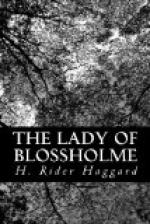On the following morning Cicely rose with the dawn, nor was she sorry to do so, who had spent but a troubled night. For long sleep would not come to her, and when it did at length, she was tossed upon a sea of dreams, dreams of the King, who threatened her with his great voice; of Cromwell, who took everything she had down to her cloak; of Commissioner Legh, who dragged her back to the stake because he had lost his bribe.
But most of all she dreamed of Christopher, her beloved husband, who was so near and yet as far away as he had ever been, a prisoner in the hands of the rebels; her husband who deemed her dead.
From all these phantasies she awoke weeping and oppressed by fears. Could it be that when at length the cup of joy was so near her lips fate waited to dash it down again? She knew not, who had naught but faith to lean on, that faith which in the past had served her well. Meanwhile, she was sure that if Christopher lived he would make his way to Cranwell or to Blossholme, and, whatever the risk, thither she would go also as fast as horses could carry her.
Hurry as they would, midday was an hour gone ere they rode out of Cheapside. There was so much to do, and even then things were left undone. The four of them travelled humbly clad, giving out that they were a party of merchant folk returning to Cambridge after a visit to London as to an inheritance in which they were interested, especially Cicely, who posed as a widow named Johnson. This was their story, which they varied from time to time according to circumstances. In some ways their minds were more at ease than when they travelled to the great city, for now at least they were clear of the horrid company of Commissioner Legh and his people, nor were they haunted by the knowledge that they had about them jewels of great price. All these jewels were left behind in safe keeping, as were also the writings under the King’s hand and seal, of which they only took attested copies, and with them the commission that Cromwell had duly sent to Cicely addressed to her husband and herself, and Bolle’s certificate of captaincy. These they hid in their boots or the linings of their vests, together with such money as was necessary for the costs of travel.
Thus riding hard, for their horses were good and fresh, they came unmolested to Cambridge on the night of the second day and slept there. Beyond Cambridge, they were told, the country was so disturbed that it would not be safe for them to journey. But just when they were in despair, for even Bolle said that they must not go on, a troop of the King’s horse arrived on their way to join the Duke of Norfolk wherever he might lie in Lincolnshire.




